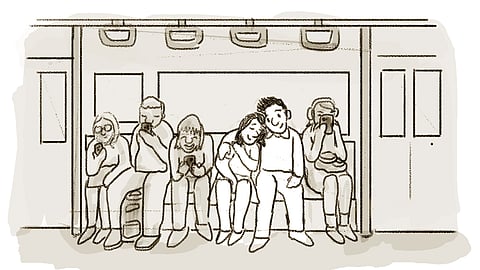
- NEWS
- the EDIT
- COMMENTARY
- BUSINESS
- LIFE
- SHOW
- ACTION
- GLOBAL GOALS
- SNAPS
- DYARYO TIRADA
- MORE

The world moves like a river of people — endlessly flowing, endlessly shifting.
The strong current carries you forward through the hallways of a mall, the platforms of a train station, the corridors of an airport. Everywhere you look, faces stream past — different eyes, different smiles, different expressions of fatigue or joy or indifference. Each one distinct, and yet, together they blur into something faceless. There are millions of faces, and yet, most of the time, none feel familiar.
This realization is not about loneliness alone, though loneliness is part of it. It is also about how fragile recognition is. What makes a face familiar is not its physical outline — the curve of a nose, the slope of a chin — but the story it carries in your life. Familiarity is built not from features but from memory: the person who once waited for you at the gate after school, the sibling who borrowed your things without asking, the friend who laughed with you until your stomach hurt. To know a face is to be bound to it by history. Without that thread, every face simply becomes another passerby.
And so, amid the crowd, we find ourselves surrounded yet unseen. The paradox of modern life is that we are closer than ever to people, physically and digitally, and yet the familiarity we grew up with that defines a community feels rare. A bus can carry 40 passengers pressed shoulder to shoulder, but each is absorbed in their own thoughts, their own music, their own digital screens. A social media feed can present hundreds of photographs in the span of a minute, and yet none of them lingers and feels real. Presence has become abundant, but recognition — true recognition — scarce.
It is easy to dismiss this as a symptom of cities, of technology, of modernity itself. But the truth traces back to the roots of history. Human beings have always walked among strangers. A marketplace in Rome, a caravan trail in Persia, a festival in ancient Manila — all these were gatherings of countless faces, most of which never became known to one another. What has changed is not the existence of strangers, but our heightened awareness of them. To live in an age of overexposure is to constantly be reminded of the sheer volume of lives we will never touch.
And yet, every one of those faces hides a new world altogether. The woman in the corner of the café nurses her coffee too slowly, carrying the grief of a phone call she cannot return. The man across the train aisle clutches his worn backpack, rehearsing the courage to finally resign from a job that has drained him for years. The teenager walking briskly ahead, earphones in, wonders whether anyone will remember her birthday. These are lives unfolding beside us, lives we rarely notice. To think of this is both humbling and heartbreaking.
But there is a certain power in anonymity, too. In a crowd where no one knows you, you are free to carry your own solitude without explanation. You are not measured by reputation or judged by past mistakes. You exist, briefly, as just another face, no different from the rest. For some, this is suffocating. But for others, it can be liberating. Perhaps, it is both. To be unknown can be a burden when you crave belonging, but it can also be a gift when you crave freedom.
And yet, despite the freedom, we still seek connection. We want someone to call our name amid the noise. We want an eye to meet ours and not look away. It is not because we cannot live among strangers — we can, and we do — but because recognition grounds us. To be recognized is to be reminded that we are not invisible.
That is why reunions feel so moving. Imagine walking through a crowd, weary from the anonymity of travel or work, and suddenly spotting a familiar face. A friend you have not seen in years. A colleague who once shared your struggles. A loved one who has waited. In that instant, the crowd dissolves. The million faces blur into insignificance because one face has broken through. The current of strangers pauses, if only briefly, to make space for recognition.
Perhaps, that is the hidden lesson. We live in a world where strangers will always outnumber the familiar. That will never change. But the scarcity of familiarity is not cause for despair, but cause for reverence. To know and be known is not an everyday occurrence, it is the exception. And it is in the exception that life finds its sweetness.
A million faces, none familiar. But all it takes is one familiar face, one voice that remembers, one hand that reaches back, to transform the landscape of anonymity into a place of belonging. And so, while we move among the countless, let us not forget the gift of the few. Let us hold on to the ones who know our stories, and in turn, let us make the effort to truly see others. For in the end, the world will always be crowded, but familiarity — the rarest of recognitions — will always be enough to anchor us.
Ivan Jeff C. Soberano is an engineer, educator and entrepreneur. He writes about growth, grit and the quiet moments that shape us. This is his latest piece for Daily Tribune.
